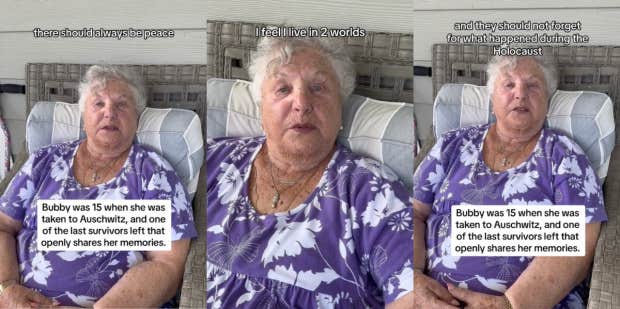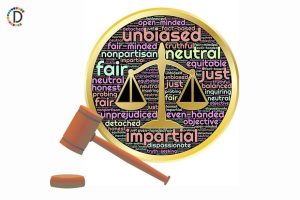Holocaust Survivor Shares Why She Continues Talking About Her Trauma

Most of us have learned about the Holocaust in school and seen the countless films recreating the events of World War II. But none of them can quite come close to hearing about the experiences of Holocaust survivors from their own mouths, in their own words.
Jewish TikToker Miriam Ezagui has been using her platform in part to amplify the stories of her 94-year-old “Bubby,” a Holocaust survivor who survived the Auschwitz concentration camp. Despite the pain it causes her to discuss those atrocities, Bubby says she’ll never stop telling her stories.
A voir aussiRed Dead Redemption statt GTA 6? Rockstar Games könnte an RDR Remake arbeiten
Ezagui’s Bubby says she shares her experiences because, as a Holocaust survivor, she lives ‘in two worlds’ and must ‘face it’ every day.
It’s difficult for most of us to imagine what it must be like to live each day with the memories of such astonishing cruelty and violence always with you. But for Ezagui’s Bubby, it’s simply who she is.
In a recent TikTok, Ezagui asked her Bubby if it ever bothers her to be asked questions about her Auschwitz experiences. She didn’t hesitate to say no. “I live with them every day. I never forget,” she said.
Avez-vous vu celaFOREX-Dolar stabil, Aussie tergelincir karena RBA semakin dekat
Bubby went on to explain what it’s like to carry the trauma of genocide. “I live in two worlds,” she said, “the past and the present. So it’s hard, but I have to face it. It’s what happened.”
Ezagui also shared that her Bubby was 15 when she went to Auschwitz and 16 when she the camp was finally evacuated in January of 1945. And with her advanced age, she is one of the few Holocaust survivors still living and able to share her firsthand experiences.
Ezagui’s grandmother says she shares her experiences as a Holocaust survivor as part of her dedication to ensuring such atrocities never happen again.
Ezagui’s Bubby has dedicated her life to speaking out about the Holocaust and, as Ezagui explained in another video, she has played important roles in founding memorials like the Holocaust Museum in Washington, D.C., where her story is featured among the exhibits.
Bubby told Ezagui that as painful as it is to remember the Holocaust, it actually makes her feel good to talk about the trauma of it. “It’s good,” because the world has to know what happened during World War II… People should be aware it should never happen again.”
For Bubby, that means sharing extraordinary and heartbreaking experiences like one she recently shared in another of Ezagui’s videos, about a boy she had a romance with while they were enduring the extraordinary abuses of Auschwitz.
Because of the separation by gender at Nazi concentration camps, their entire relationship was conducted through an electrified fence. They’d meet at the fence to discuss their hopes and dreams for the future if they could manage to survive.
The boy also used to bring Bubby presents. “He gave me between the electric wires a pair of gloves,” Bubby said of one of the boy’s gifts. “He says it’ll keep your hands warm.” The boy and Bubby had made plans to find each other if they survived. “If I survive, I will send messages through the radio and look for you,” he told her.
Bubby said she listened to the radio regularly after being evacuated from Auschwitz, but never heard any messages from the boy. “I assumed he didn’t make it,” she told Ezagui.
Bubby’s heart-rending experiences as a Holocaust survivor are a testament to the strength of the human spirit, and they’re all the more vital in a time when anti-semitism is on the rise all over the world.
It’s hard to decide which is more incredible — that people like Ezagui’s Bubby were able to survive the Holocaust at all, or that they were able to remain so open-hearted in the face of unfathomable hatred and murderous abuse.
The traumas Holocaust survivors endured are so intense, in fact, that they have even moved science forward. Our understanding of concepts like generational trauma is largely owed to studies of the experiences of Holocaust survivors, which revealed that such trauma actually changes genetic expression, a process called epigenetics.
Stories like Bubby’s and the light they shed are all the more vital in today’s world, because as right-wing extremism has been on the rise, so has anti-semitism. The Jewish Anti-Defamation League, the foremost organization for tracking anti-semitism, reports that anti-Jewish attacks in the US hit an all-time high in 2022.
Meanwhile, Holocaust denial has also skyrocketed, both online and in some school systems — and it’s no longer just among right-wing extremists and conspiracy-minded crackpots on the fringes.
The problem has become so pronounced that US State Department official Ellen Germain recently called for increased Holocaust education.
It’s all the more reason to be grateful that people like Ezagui’s Bubby are still with us, and able to speak about the horrors they somehow were able to survive during the last great wave of anti-semitic sentiment.
“I want the world to know,” she told Ezagui, going on to say people “should remember and be aware and watch. There should always be peace.”
John Sundholm is a news and entertainment writer who covers pop culture, social justice and human interest topics.



